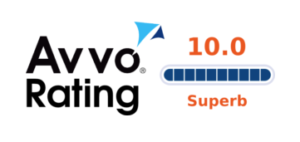



Dedicated Standard Insurance Company Lawyers Serving Claimants Across the United States
The Standard Denial
The Standard Appeals
The Standard Lawsuit
Suffering a debilitating disease or sickness can produce nightmares by itself. Even worse, securing your income—during this time in which you can’t work—can seem impossible. If you have disability insurance, it should promptly provide income protection in the event that you suffer a disability. The reality, however, is that disability insurance companies can deny or delay claims wrongfully—failing to show up for you when you need them most. If your employer provides disability insurance through The Standard Insurance Company or its affiliates, such as Minnesota Mutual, we’re not surprised to hear about delayed or denied claims. The Standard Insurance Company Lawyer at DarrasLaw can help.
DarrasLaw stands up to the biggest disability insurance companies—and wins. We are the top disability-law firm in the United States, and we regularly handle disability claim disputes and appeals involving The Standard Company. Our disability claim denial lawyers are committed to helping disabled claimants when insurance companies wrongfully deny or delay their legitimate claims. If you believe your disability insurance company wrongfully denied your claim, or if you are getting the classic run-around, we can help you pursue what is rightfully yours.
We offer free consultations—which can include an analysis of your insurance policy and help with your claim. To discuss your case with an insurance disability claim denial attorney today, please call our office at 800-898-7299, or send us an email through our online contact form.
Meet Our Disability Attorneys
Frank N. Darras, Founding Partner
- Experience: Over 30 years exclusively focused on LTD/long-term care insurance litigation.
- Track Record: Nearly $1 billion recovered for policyholders.
- Awards & Recognition:
- Named to Lawdragon’s Top 500 Lawyers in America for 18 years
- AV-Preeminent® (Martindale-Hubbell), Best Lawyers in America since 2006
- Frequent speaker and author on ERISA and disability insurance.
Susan B. Grabarsky, Senior Trial Attorney
- Represents both individual policyholders and groups in disability insurance disputes.
- Former cost-containment analyst for insurers—uses insider knowledge to challenge denials.
Heather Gardner, Senior Associate
- Specializes in individual and ERISA disability legal appeals.
- Works directly with Dr. Darras on complex cases
Phillip S. Bather, Associate Attorney
- Expert in bad-faith and ERISA disability cases.
- Conducts client intake and prepares administrative appeals
The Standard Company Disability Insurance Policies
Disabilities are physical or mental illnesses or injuries that prevent people from completing their normal occupational duties. Disabilities can include neck or back injuries, cancer, heart, and many other physical or mental medical conditions.
 The Standard Insurance Company (The Standard) is the fourth largest group disability provider in the country, collecting $1 billion worth of premiums each year for short-term disability and long-term disability insurance. The Standard offers group and individual disability insurance—ranging from basic, essential options to premium, platinum options. The technical differences for each plan allow The Standard to deny or delay claims for things you could think it should cover but actually doesn’t. If unsure, those with The Standard disability insurance policies should carefully review the terms of their coverage with a nationally experienced disability insurance attorney.
The Standard Insurance Company (The Standard) is the fourth largest group disability provider in the country, collecting $1 billion worth of premiums each year for short-term disability and long-term disability insurance. The Standard offers group and individual disability insurance—ranging from basic, essential options to premium, platinum options. The technical differences for each plan allow The Standard to deny or delay claims for things you could think it should cover but actually doesn’t. If unsure, those with The Standard disability insurance policies should carefully review the terms of their coverage with a nationally experienced disability insurance attorney.
Minnesota Mutual Life Insurance Company is largest life insurance company affiliate of Securian Financial Group, Inc. It partners with The Standard to provide disability insurance to its clients. Together, The Standard and Minnesota Life cover more than four-million persons under private and group disability policies.
The Disability Claim Process:
1. The First Step: Filing a Claim
If you suffer a disability and you hold a policy with a disability insurance company—like The Standard, Minnesota Mutual, or some other company—the first step in receiving any benefits is to timely file a claim with your disability insurer.
This process can include filing: a form (or multiple forms) describing your injuries or sickness as well as your normal occupational duties and demands; requests for salary and earning information; and statements from your doctor that detail your restrictions and limitations, care and treatments—all typically verifying your inability to perform your important occupational duties with your current health status.
After you turn in all of the required documentation, the insurance company can approve your claim, request more information, or delay and later deny your claim.
2. The Problem: An Insurer Delays or Denies Your Disability Claim
Insurers must provide you with an explanation if they choose to delay or deny your claim. This explanatory document can take several forms. Common reasons for denial can include: policies that only approve claims involving certain kinds of ailments or injuries; policies that have limitations beyond which the company will not provide benefits; missed proof of loss or document deadlines and untimely submissions of requested items; and disagreement with your doctor’s medical findings about your restrictions and limitations.
The options available to you—after the insurance company delays or denies your claim—will depend upon your particular circumstances. If your employer provides your group disability insurance, you will need to appeal your denial through the administrative process before you can file an official ERISA lawsuit. If you are unfamiliar with this administrative process, an experienced long-term disability lawyer can help with your appeal. If, on the other hand, you carry a private, individual insurance plan, your options will depend on the specific terms of your policy. You might file a lawsuit without undergoing any prior administrative process.
A disability insurance claim denial attorney can help whether you face negotiations, arbitration, an administrative process, or a formal lawsuit.
3. What Is an Administrative Appeal?
Sometimes the federal law under ERISA requires that you go through an administrative appeal, per the terms of your policy. The administrative process requires timely submission of all documentation of your physical and mental conditions that prevent you from doing your own occupation or any occupation for which you are trained, educated, or suited. Also required is a complete rebuttal to each and every reason your group disability insurer denied your claim.
Beware. The administrative process can include specific directions and deadlines for submitting documents and proof. If you find yourself subjected to an administrative appeal, take it seriously and abide by all rules—your failure to do so generally precludes you from filing a formal suit later. Because the process can confuse and intimidate those who don’t know how it works, speak with an experienced ERISA appeal lawyer first (or as soon as you possibly can).
4. The Lawsuit
If neither the law nor your policy require you to go through an administrative appeal before filing an individual disability suit, or if you went through the process without achieving a successful resolution, you may have the option to file a formal lawsuit against your insurer. The type of lawsuit you file will depend on your policy type. From the time you file your initial claim for benefits with your disability insurer, you must keep in mind that your insurer may choose to delay or deny your claim—and a lawsuit could result. Save every document related to your claim and the details of the processes that you’ve gone through. The judge is likely to give significant weight to the documents you presented on appeal or provided—the more complete of a record you provide, the more it can help you to get the outcome you deserve.
5. Even if You Win Your Lawsuit, There Is More
Keep an eye on the benefits you’ve received—they are not endless. Keep up with documentation supporting your inability to work for as long as you are unable to work. Often, insurers must reapprove your benefits to keep them coming past a certain amount of time—which they should outline in your policy. If your insurer didn’t outline it or if you are unclear, request the information, and talk to a disability lawyer.
The complex claims process is filled with important dates and deadlines. No wonder if it may sound and feel overwhelming. An experienced insurance disability lawyer can help you navigate this difficult process.
Keep All Papers!
If The Standard Company—or any other disability insurance company—delays or wrongfully denies your claim, keep (or retrieve) copies of all correspondence between you and them whenever possible. This can include information that The Standard Company provided to you, and also information that you provided to them. Such documents can include, but are not limited to:
- Any documents providing additional information that your insurance company requested or that you voluntarily sent to the insurance company (like medical documents, pharmacy records, and tests provided by your doctor, that support your claim).
- A copy of your request for an appeal, if applicable.
- If someone else filed an appeal for you, a copy of any form or letter you signed permitting that person to so do.
- Any document showing your benefits paid or denied.
- Notes and dates from as many phone and email conversations as you had with The Standard Company—or any other relevant professional—relating to your delay, denial, or appeal. Be as specific and detailed as you can—always try to include things like the day, time, name, and title of the person you talked to, as well as any important information shared or discussed in the conversation.
This list is not exhaustive, but it should provide you with an idea of the things you will need to collect. Reaching a successful resolution for your disability claim denial can rest on seemingly small things—like what someone said or did not say, what someone did or did not do, and when those things took place.
If you cannot find all of the documents that you think are relevant, do not despair. Find what you can, make note of documents you remember submitting but can’t locate, and save everything moving forward.
How Will I Know If My Denial Was Wrongful?
The Standard Company and all other insurance companies have an obligation to act in good faith and to fulfill their contractual obligations to their policyholders. Unfortunately, they often fall short. Many disabled people suffer unreasonable delays in receiving their benefits; others experience wrongful denials of their claims.
We have helped thousands of clients level the playing field by taking on insurers like The Standard and Minnesota Life—holding them accountable for unfair or fraudulent practices. We will analyze the reasons cited for your delay or denial and compare them to the actual circumstances of your disability case. Our team has its own investigators, experts, and other umatched resources to help successfully appeal or litigate a wrongful denial. We can address denials, disputes, and questions arising from:
- Bad faith denial of claims by The Standard Company
When a policyholder files a claim with The Standard Company or any insurance company, the law requires that the company act in good faith. This means that the law does not allow insurance companies to get away with looking for ways to avoid paying rightful claims. When insurance companies do this, they act in bad faith. Bad faith claims and lawsuits can arise in many ways, including, but not limited to:
- Unjustified denials of disability coverage
- Failure to provide a prompt and reasonable explanation for a claim denial
- Failure to reasonably investigate a claim with an eye towards payment
- Refusing to pay a claim without proper investigation
- Failing to make a claim decision within a reasonable amount of time
- Failure to relate relevant information to the claimant (or person filing the claim)
- Unjustified delays in paying claims by The Standard Company
Insurance companies are required to pay approved claims within a reasonable amount of time—the specifics will vary depending on the circumstances and policies.
- Unjustified termination of disability benefits by The Standard Company
In certain cases, insurance companies may lawfully terminate your benefits/coverage. This can depend on the terms of your policy and other intervening factors. This does not, however, justify every termination. If you have questions, let your disability insurance lawyer address them immediately.
- Ignoring treating physician statements about restrictions and limitations, medical testing, and chart note observations in reviews by The Standard Company
The Standard Company—and nearly all group disability insurance providers—include discretionary language in their policies that allows them to attempt to disregard your physician’s statements and medical records when choosing to deny your claim. This does not mean, however, that you can’t fight back. Depending on the circumstances, insurance companies’ decisions to ignore physician statements and medical records can constitute bad faith in individual policies and an arbitrary and capricious finding on group ERISA claims.
- Spying on and videotaping claimants through private investigators retained by The Standard Company
Insurance companies have hired investigators to spy on claimants (like you) to gain evidence that disputes the disability claim. This is especially common with disabilities such as neck or back claims or fibromyalgia. These unsettling investigative tactics can range from taking photographs to daily stakeouts. Talk to an experienced disability lawyer if you are concerned that this may have happened (or is happening) to you.
- Endless requests for information by The Standard Company
In some cases, insurance companies can make the burden of filing a claim unbearable. Endless requests for information may cause you to give up on your claim or, if the burden overwhelms you, you might miss essential filing deadlines and provide reasons for the insurance company to unfairly deny or delay your claim. Experienced disability denial attorneys can help you address these and other claim issues.
- Independent Medical Examinations (IME) by The Standard Company
The Standard Company may conduct an IME to determine the cause, severity, and expected medical limitations of an injury or sickness—where their liability is at issue. Doctors with no connection to the claimant and some fidelity to the insurance company, however, normally perform these IMEs. As you can imagine, doctors can conduct these IMEs unreasonably and in bad faith. If you have questions, contact your disability insurance lawyer.
- Functional Capacity Evaluations (FCE) by The Standard Company
Your insurance company can use an FCE to independently assess whether you can perform the important duties of your employment. They determine this by comparing your health status to the physical and mental demands of the job and the work environment. Their findings could contradict the findings of your treating doctor. As you can imagine, issues may arise. Keep all your relevant medical documents.
- Lowball settlement offers from The Standard Company
After receiving the initial settlement offer for your insurance claim, you may have to decide whether to accept or deny it. Insurance companies want to pay as little as possible, so they tend to make extremely low initial offers. They have a range of compensation to offer but tend to propose the lowest figure first, hoping you’ll accept it without contest. Talk to an experienced disability lawyer; skillful negotiators can lead to better settlement offers.
- Invoking ambiguous The Standard Company policy limitations
Insurance companies are legally responsible for communicating the terms of their policies to policyholders. Ambiguous terms—which are, by definition, unclear—can prove as bad, or worse than, undefined ones. If you are concerned that your policy contains ambiguous policy limitations, and your insurer has delayed or denied your claim as a result, reach out to a disability claim denial attorney who can help.
- Frequently transferring claims to new examiners/adjusters by The Standard Company
To get you the best outcome possible, an experienced disability litigation lawyer leaves no stone unturned when determining whether insurers employed bad faith practices. Frequently transferring claims to new examiners/adjusters can indicate bad faith in certain circumstances.
How Do I Afford a Disability Insurance Lawyer?
An unexpected period of disability often results in financial hardship for you and your family. For this reason, many disabled people find themselves frustrated: How do you hire a top-rated attorney to fight for the coverage and benefits you know—or suspect—you’re entitled to while lacking the money to cover the costs of attorney fees?
If you find yourself in this financial situation, please don’t worry! At DarrasLaw, we take all of our disability claim delay and denial cases on a contingent fee basis. This means that you do not pay us upfront. We do not collect fees unless we handle your case successfully.
We cover all up-front costs associated with your case—including medical evaluations, investigations, and court costs (in the event that your case goes to trial). We hope to help as many disabled people from all across the country as we can. This contingent fee arrangement helps us ensure that more people who need an experienced, top-rated disability claim-denial lawyer can get one.
Real Results for Real Clients
- Chronic Migraine Appeal – 2024
We reverse Standard’s initial denial via compelling vocational and medical evidence; benefits approved internally. - Fibromyalgia – 2022
52-year-old engineer denied benefits—secured over $300,000 in retroactive payments after targeted medical and vocational submissions. - Degenerative Disc Disease – 2021
Obtained fast approval using biomechanics expert testimony and high-resolution imaging.
Hundreds of Millions of Dollars Recovered for Disabled Clients—Contact DarrasLaw Today!
If you have a disability that prevents you from working and are getting the runaround from your insurance company—or if your insurance company already denied your claim—speak with an experienced disability insurance attorney as soon as you can.
DarrasLaw is a nationally recognized, top-rated disability law firm. We are fully committed to our mission: to serve the disadvantaged and disabled by ensuring they receive what their insurance companies rightfully owe them. Our compassionate, expert disability lawyers have the skill and experience to take on large insurers at the negotiating table and, if necessary, win in the courtroom.
If you believe that The Standard Company wrongfully denied, unjustifiably delayed, or defrauded you in your individual or long-term disability insurance claim, we offer free consultations and policy analyses. Our nationally renowned founding partner Frank N. Darras is one of the top 100 trial attorneys in the United States. At DarrasLaw, we handle individual and long-term disability cases throughout the United States. Call us at 800-898-7299 or contact us online.
Disclaimer: This page is for informational purposes only and does not constitute legal advice. Every claim is unique. Prior outcomes do not guarantee future results. For advice specific to your situation, consult with a licensed attorney.
Frequently Asked Questions (FAQs)
How can I tell if I have a valid case against The Standard?
You may have a case if your benefits were denied or stopped despite thorough medical documentation or if you faced unreasonable delays or procedural errors. A disability attorney can analyze your claim file, policy terms, and medical records to determine next steps.
To learn if you have a valid case against The Standard, click here.
Are The Standard’s disability claims usually governed by ERISA?
Yes—most employer-provided group policies from The Standard fall under ERISA rules. ERISA sets strict deadlines and limits on lawsuits, so acting quickly after a denial is critical.
To find out more about ERISA and the role it plays in The Standard disability claims, click here.
What makes ERISA lawsuits against The Standard different from other insurance disputes?
Under ERISA, courts generally review only the evidence submitted during the claim and appeal process, and punitive damages or jury trials aren’t available. That makes building a thorough administrative appeal essential before filing suit.
How long do I have to appeal a denied claim with The Standard?
You typically have 180 days from the denial letter to submit an appeal, though some policies may specify shorter deadlines. Missing this window can eliminate your ability to sue in federal court.
Which medical conditions are most often challenged by The Standard?
Claims involving fibromyalgia, chronic pain, mental health disorders, cardiovascular disease, and neurological conditions are frequently disputed. These are sometimes labeled “subjective” conditions even when well-supported by treating doctors.
What evidence should I include in an appeal to The Standard?
Submit all medical records, diagnostic tests, and detailed physician statements. Add vocational reports, daily limitation logs, and any relevant correspondence or witness statements that show how your condition prevents you from working.
Should I handle an appeal against The Standard without an attorney?
While you can file on your own, it’s risky because ERISA limits what evidence can be added later in court. An experienced disability lawyer can ensure every key document and argument is included to protect your rights.
What compensation can I recover if I win a lawsuit against The Standard?
Successful plaintiffs may receive back-pay of benefits, reinstatement of monthly payments, attorney’s fees, and interest. In individual (non-ERISA) policies, you may also pursue additional state-law remedies for insurance bad faith.
How can a disability lawyer help me fight The Standard?
A lawyer familiar with ERISA and long-term disability claims can review your policy, organize evidence, craft a strong appeal, and represent you in federal court if necessary. They help level the playing field against a major insurer with substantial legal resources.






